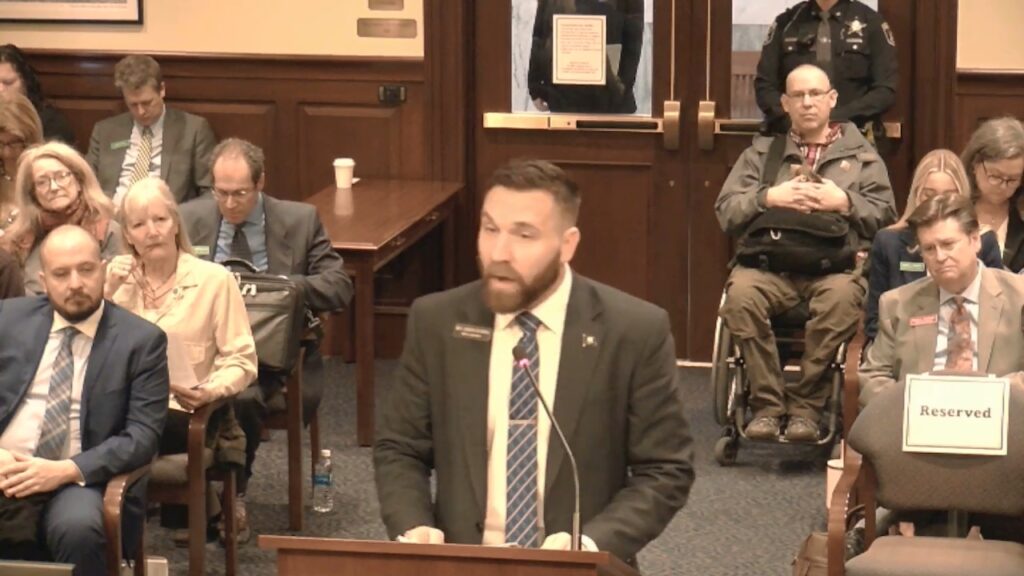This morning, Rep. Jordan Redman presented House Bill 419 to the Health & Welfare Committee. This bill would put specific measurable guardrails on Medicaid Expansion, which voters approved in 2018, that if not met would withdraw Idaho from the program.

For several hours, representatives of the healthcare industry joined with people who depend on Medicaid to pay their bills testified against the measure. In the end, the committee voted 8-5 to hold the bill, effectively killing any hope of Medicaid reform this year. Five Republicans and three Democrats agreed that Medicaid Expansion has become too essential for too many people to risk putting any conditions on its future.
How did we get to the point where even Republican legislators are unwilling to countenance changes to a massive entitlement program with skyrocketing costs?
Medicaid was created in 1965 as part of President Lyndon Johnson’s Great Society and expanded by President Barack Obama’s Affordable Care Act. The initial purpose of Medicaid was to cover children, those in poverty, and people with disabilities. Obamacare expanded the program to include able-bodied adults who were either out of work or didn’t make enough money to qualify for the basic program.
Medicaid was technically voluntary, but by 1982 all fifty states had signed on. Medicaid Expansion was also voluntary, but Idaho voters approved a ballot initiative in 2018 that brought that here as well. As with all government programs, once enacted it is very difficult to shut down. Once people have a taste of free stuff, it’s hard to convince them to say no. Nearly half a million people are enrolled in Idaho’s Medicaid program.
There is a point in a society when a critical mass of the population becomes dependent upon government for taking care of their every need. Once a society crosses that line, it becomes very hard, if not impossible, to scale back entitlements. This morning’s testimony suggests to me that we have crossed that line.
Several people testified that without Medicaid Expansion, they would not be able to pay their bills. One person even called healthcare a “right”. When I said on Twitter how absurd this statement was, my mentions filled up with people saying I want sick people to die or that civilized nations take care of their people. These people reacted to the idea of “personal responsibility” like vampires to sunlight.
How can a lawmaker resist such emotional appeals? “If you don’t keep paying my bills, I’m going to die” is a heck of a pitch. But that doesn’t change the fact that if your “right” requires the labor of another human being, then you are explicitly advocating for slavery. You are demanding that someone else work for your benefit. No matter how much you sugar coat it, that’s the plain truth.
What our Founding Fathers recognized as inalienable God-given rights do not require anything of other people. Your right to free speech does not mean others are required to provide you with a megaphone and your right to practice your religion does not obligate others to build you a church. But a “right” to healthcare, a “right” to housing, and a “right” to a job create obligations on others. A “right” to healthcare means that either doctors, nurses, and hospital staff must work for free – literal slavery – or it means they are reimbursed by confiscated resources from productive citizens.
Besides the moral problem with entitlements, they are a fiscal drain as well. When Reclaim Idaho put Medicaid Expansion on the ballot in 2018, they promised it would be fiscally conservative. Today, the cost of Medicaid has ballooned to nearly $5 billion and represents the largest single chunk of the state budget. Most of that money comes from the federal government, but at $34 trillion in debt and counting, that source of funds is a ticking time bomb.
Last year, former representative Ron Nate wrote a great article for the Idaho Freedom Foundation examining what our state might look like without Medicaid. It’s worth reading, because proponents of government welfare always talk as if there are no other options besides more entitlements.
If it’s our moral duty to pay for everyone else’s healthcare costs, where does it end? People need houses, should taxpayers foot that bill too? What about food and clothing? Should taxpayers subsidize internet access?
The problem, as any honest student of economics understands, is that third party payers always disrupt the market. When the market is operating properly, both consumers and producers have access to price signals that show the state of supply and demand. Consumers respond to demand by increasing or decreasing both the supply of goods or services or their price, while consumer demand changes depending on those factors as well.
When third party payers, such as insurance companies or the government, enter the picture, those price signals are distorted. Consumers use more of a service if they know they don’t have to pay all or part of the cost, so producers have no incentive to keep prices commensurate with market demand. Healthcare providers not only have to charge more to cover entire departments dedicated to satisfying insurance companies’ billing practices, but they can infinitely inflate their costs because nobody is actually paying market value.

A few years ago, one of my children required a medical procedure. I didn’t have insurance, so I paid out of pocket, and the provider slashed 30% as an incentive for paying cash. If third party payers were not part of this market, the cost would have been even lower, since providers wouldn’t need to pay for huge staffs to manage insurance and consumer choice would force them to compete on price.
Americans have a mistaken view of the purpose of insurance. Your car insurance policy doesn’t usually cover filling your gas tank or changing your oil, and your home insurance policy doesn’t usually cover replacing your light bulbs. But we expect health insurance to pay for everything, and that desire has led to government involvement in an already broken industry. Rather than making things easier and cheaper, Obamacare only made things worse, and now at least half the country believes its within the purview of government to pay for the medical bills of every American (and even illegal aliens in some places).
Today’s hearing demonstrated that there is little political courage to tackle these out-of-control entitlement programs. We’re going to keep dumping money into them until the whole system collapses, at which point we will wish we had figured out an alternative free market solution when we had the chance.
Bonus note for paid subscribers at Substack. Get these posts in your email for free here.
About Brian Almon
Brian Almon is the Editor of the Gem State Chronicle. He also serves as Chairman of the District 14 Republican Party and is a trustee of the Eagle Public Library Board. He lives with his wife and five children in Eagle.














3 Comments
Comments are closed.